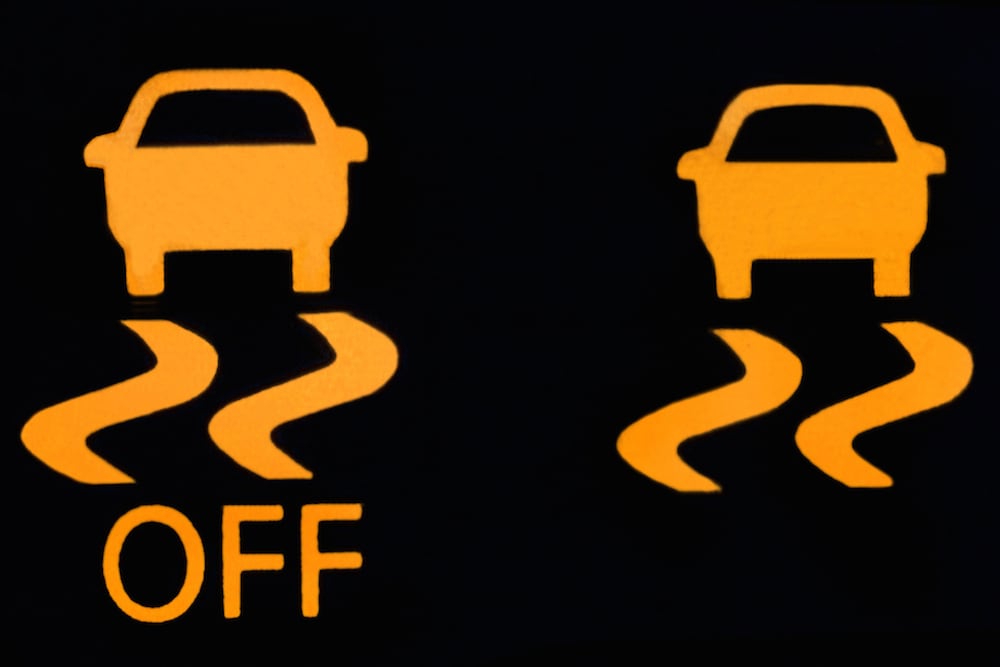

The traction control system (TCS) helps a driver maintain control and stability of the vehicle if it loses grip and starts to skid or slide. The TCS automatically senses when a wheel loses traction at any time and can be triggered automatically as soon as this is detected. Loss of traction most commonly occurs in ice or snow, so the TCS shifts power from the wheel that is slipping to the wheels that are still gripping the pavement well.
Your traction control system lets you know it’s working and not working when the TCS light turns on. If the light comes on when it’s supposed to, it means it’s safe to drive with the TCS light on; if it doesn't, it means it’s not safe. Determine whether its safe to drive by understanding these 3 reasons your TCS light may come on:
1. Temporary Loss of Traction
Some TCS lights come on when there is rainy or snowy weather and then disappear. When this happens, it means the system is activated due to low-traction road conditions (ice, snow, or rain) and is assisting the vehicle with maintaining traction. It may even flash briefly if you momentarily pass over a slick spot on the road. TCS intervention can be so subtle you might barely notice it. It is a good idea to read the owner’s manual that came with your car to ensure you know how your TCS works and to know what to expect in these conditions.
Is it safe in this situation? Yes. The most important thing to remember here is that the TCS light coming on, and often flickering on and off while it's activated, means the system is functioning properly. You should still drive with caution on wet or slippery roads, but seeing the light in these circumstances indicates your traction control system is working.
2. Faulty Wheel Speed Sensor
A set of wheel speed sensors at each wheel control the TCS and ABS (anti-lock brake system) to let your traction control computer know whether or not each wheel is rolling correctly or slipping in any way. Should the sensor detect slippage, it activates the TCS to reduce power to the affected wheel to let it regain traction, causing the light will engage for a short time.
A failing wheel speed sensor, or damages in its wiring, disrupts the connection between the wheel and TCS computer. This prevents the TCS working on that wheel, so the light will illuminate and stay lit until addressed. It may even turn on a “TCS off” light to indicate the system is not functioning.
Is it safe in this situation? No. If the light comes on, and you obviously have traction, it is safe enough to drive yourself to place to get an inspection of the light. However, a mechanic should check the TCS as soon as possible. A lingering or flickering light tends to mean the TCS is not working. Should you encounter adverse road conditions, the system will not engage and you face potential damage to the vehicle and yourself.
Note: some cars allow you to manually turn traction control off, in which case the "TCS Off" light will also illuminate. Only experienced drivers should do this at their own risk.
3. Failure of TCS Computer
Controlling the actual system, the TCS computer has a vital role in proper traction control function. The whole system can go offline should corroded contacts, water damage, or malfunctions occur. This will activate the TCS light, and potentially the ABS light as well.
Is it Safe in this Situation? No. Like having a faulty wheel speed sensor, a failing TCS computer disallows the information about wheel traction to be acted upon. The system will not engage when it needs to. Again, drive carefully to a location where service can be requested and performed.
Is it Safe to Drive with the TCS Light On?
It is only safe to drive with the TCS light on if it appears when you are losing traction: it means the system is engaging. Driving without traction control can make your vehicle susceptible to spinning out and sliding around on the road. It is best to keep your TCS in working condition and enabled in case hazardous weather pops up. This allows you to maintain control of your vehicle at all times.
Driving with your TCS Light on can be dangerous. You increase the potential of losing control of your vehicle. The TCS helps control the stability and traction of your vehicle, so without it, the vehicle may not handle slick roadways as it should. If your TCS Light remains on, your safest course of action is to have a certified mechanic perform a system inspection and TCS module replacement if necessary.



